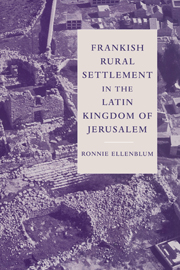Book contents
- Frontmatter
- Contents
- List of illustrations
- List of tables
- Acknowledgments
- List of abbreviations
- Map 1 Frankish rural sites in Palestine
- PART I PRESENTATION OF THE PROBLEM
- PART II THE “CASTRUM,” THE BURGUS, AND THE VILLAGE
- 3 Castellum Regis
- 4 Evidence about the existence of Frankish settlements
- 5 The rights and duties of the Frankish settlers in Casale Imbert and Nova Villa
- 6 The settlers: places of origin and occupations
- 7 The geographic layout of a Frankish village: the example of Parva Mahomeria
- 8 The neighborhood of a Frankish castrum: the fields and the role played by the castellan
- 9 A church as the nucleus of a settlement
- 10 Mixed Frankish and local Christian settlements
- 11 Frankish settlements and the collection of tithes
- PART III THE ISOLATED DWELLINGS
- PART IV THE SPATIAL DISTRIBUTION OF FRANKISH SETTLEMENT
- Bibliography
- Index
11 - Frankish settlements and the collection of tithes
Published online by Cambridge University Press: 19 January 2010
- Frontmatter
- Contents
- List of illustrations
- List of tables
- Acknowledgments
- List of abbreviations
- Map 1 Frankish rural sites in Palestine
- PART I PRESENTATION OF THE PROBLEM
- PART II THE “CASTRUM,” THE BURGUS, AND THE VILLAGE
- 3 Castellum Regis
- 4 Evidence about the existence of Frankish settlements
- 5 The rights and duties of the Frankish settlers in Casale Imbert and Nova Villa
- 6 The settlers: places of origin and occupations
- 7 The geographic layout of a Frankish village: the example of Parva Mahomeria
- 8 The neighborhood of a Frankish castrum: the fields and the role played by the castellan
- 9 A church as the nucleus of a settlement
- 10 Mixed Frankish and local Christian settlements
- 11 Frankish settlements and the collection of tithes
- PART III THE ISOLATED DWELLINGS
- PART IV THE SPATIAL DISTRIBUTION OF FRANKISH SETTLEMENT
- Bibliography
- Index
Summary
The limited number of Latin documents which deal with the rural areas does not allow for the complete reconstruction of the parochial system of the church in the rural areas, although we do have fragmented evidence of the existence of such a system (as I shall later show). All that can be shown is that the parochial churches served not only the Franks who lived in the villages but also those who lived in the “maisons fortes” and in the manor houses in their vicinity.
One component of this parochial system is very intriguing and is integral to the concerns of this book: the collection of tithes. From the various documents dealing with tithes and those dealing with disputes between the church and Frankish settlers, one can learn a great deal about Frankish settlement, the rural way of life, and the administration of the Frankish rural regions. In one document, issued by the bishop of Acre, a dispute concerning church hegemony and the payment of tithes between the Master of the Teutonic Order and the bishop of Acre is described. The bishop details the demands presented to him by the Germans, his demands in return, and the compromise reached between them through arbitration. The names and status of the arbitrators are not mentioned in the document, which deals mainly with the extent of the exemptions granted and not granted to the Teutonic Order by the secular church.
- Type
- Chapter
- Information
- Frankish Rural Settlement in the Latin Kingdom of Jerusalem , pp. 145 - 156Publisher: Cambridge University PressPrint publication year: 1998



